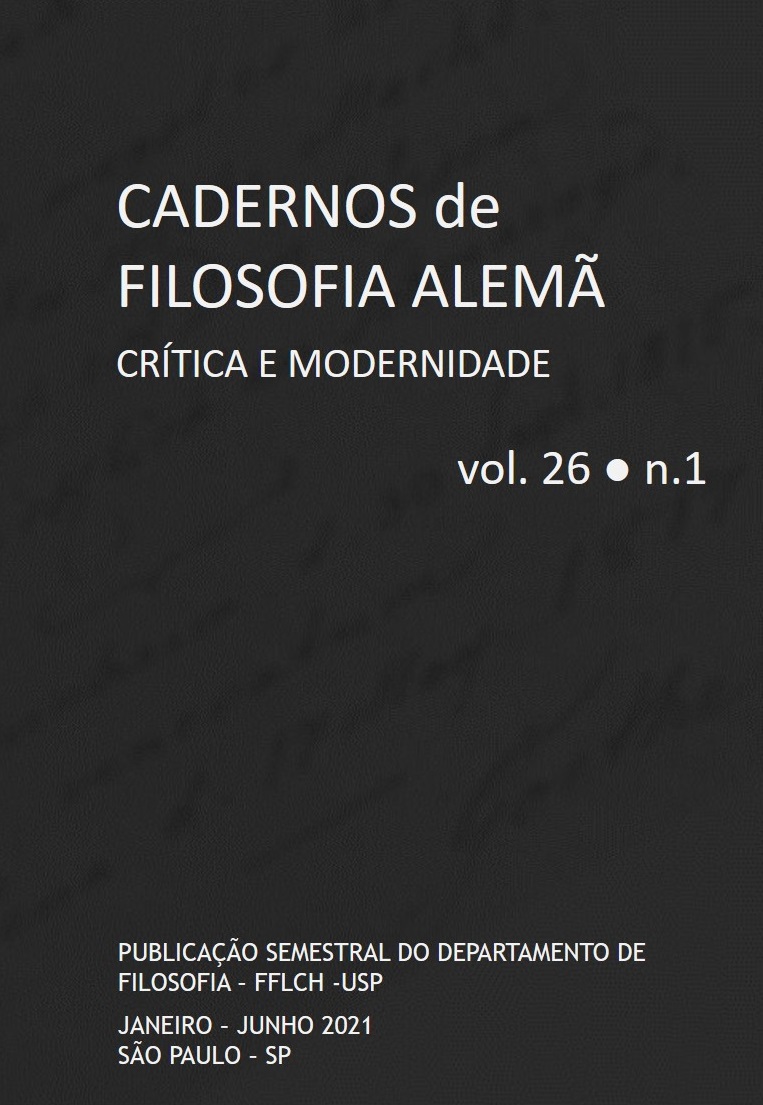O fundacionalismo de Thomas Reid
DOI:
https://doi.org/10.11606/issn.2318-9800.v26i1p13-32Palabras clave:
Epistemologia, Filosofia da ciência, Fundacionalismo, Thomas ReidResumen
O objetivo do artigo é discutir em que medida Thomas Reid está comprometido com uma teoria fundacionalista da justificação epistêmica. Para tal, apresentam-se duas discussões. Em primeiro lugar, argumenta-se que apesar de ser um fundacionalista em geral, Reid não o é em relação a todos os âmbitos do conhecimento - como é o caso da política. Para compreender essa hipótese, distingue-se sua concepção axiomática de ciência de sua visão fundacionalista da estrutura do conhecimento. Em segundo lugar, apresentam-se objeções às interpretações que pretendem que Reid é um antifundacionalista, um coerentista, ou um fundarentista.
Descargas
Referencias
Bonjour, L. (1985). The Structure of Empirical Knowledge. Cambridge, Massachusetts and London: Harvard University Press.
Brun-Rovet, E. (2002). Reid, Kant and the Philosophy of Mind. The Philosophical Quarterly, LII(209), 495-510. DOI: https://doi.org/10.1111/1467-9213.00282
Chisholm, R. (1964). The Myth of the Given. In: Philosophy. Roderick Chisholm et al. (eds.). Englewood Cliffs: Prentice Hall.
De Bary, P. (2002). Thomas Reid and Scepticism: His Reliabilist Response. London and New York: Routledge, pp. 235-244.
De Paul, M. (2011). Foundationalism. In: The Routledge Companion to Epistemology. Sven Bernecker e Duncan Pritchard (eds.). London / New York: Routledge.
Freitas, V. (2018). A ciência política em Thomas Reid. Analytica. XXII(1), 39-61.
Freitas, V. (2020). A resposta de Thomas Reid ao ceticismo. In: Síntese: Revista de Filosofia, XLVII(147),23-44. DOI: https://doi.org/10.20911/21769389v47n147p23/2020
Freitas, V. (2020) A noção de ‘senso comum’ em Thomas Reid. Discurso. L(1), 219-237. DOI: https://doi.org/10.11606/issn.2318-8863.discurso.2020.171580
Greco, J. (2004). Reid’s Reply to the Skeptic. In: The Cambridge Companion to Thomas Reid. Terence Cuneo e Rene Woundenberg (eds.). Cambridge: Cambridge University Press.
Haack, S. (1993). Double-Aspect Foundherentism: A New Theory of Empirical Justification. Philosophy and Phenomenological Research, LIII(1), 113-128. DOI: https://doi.org/10.2307/2108056
Haakonssen, K., Wood, P. (2015). Introduction. In: Thomas Reid on Society and Politics. Edinburgh: Edinburgh University Press.
Lehrer, K., Smith, J. (1985). Reid on Testimony and Perception. In: Canadian Journal of Philosophy. Volume suplementar XXI, 21-38. DOI: https://doi.org/10.1080/00455091.1985.107158888
Lehrer, K. (1986). Reid on Consciousness. Reid Studies, I, pp. 1-9.
Lehrer, K. (1989). Thomas Reid. London e New York: Routledge.
Lehrer, K. (2013). Thomas Reid on Common Sense and Morals. The Journal of Scottish Philosophy. XI(2), pp. 109-130. DOI: https://doi.org/10.3366/jsp.2013.0052
Malherbe, M. (1991). Reid et la Possibilité d’une Philosophie du Sens Commun. Revue de Métaphysique et de Morale, 96e Année, número 4, 551-571.
Poore, G. (2015). Theism, Coherence, and Justification. In: Thomas Reid on Mind, Knowledge, and Value. Rebecca Copenhaver e Todd Buras (eds.). Oxford: Oxford University Press.
Redekop, B. (2001). Thomas Reid and the Problem of Induction: From Common Experience to Common Sense. Studies in History and Philosophy of Science, XXXIII, 35-57. DOI: https://doi.org/10.1016/S0039-3681(01)00022-X
Reid, T. (1997). Inquiry into the Human Mind on the Principles of Common Sense. Derek Brookes (ed.). Edinburgh: Edinburgh University Press.
Reid, T. (2002). Essays on the Intellectual Powers of Man. Derek Brookes (ed.). Edinburgh: Edinburgh University Press.
Reid, T. (2010). Essays on the Active Powers of Man. Knud Haakonssen e James Harris (eds.). Edinburgh: Edinburgh University Press.
Reid, T. (2015). Thomas Reid on Society and Politics. Knud Haakonssen e Paul Wood (eds.). Edinburgh: Edinburgh University Press.
Stern, R. (2004). Coherence as a Test for Truth. Philosophy and Phenomenological Research, LXIX(2), 296-326. DOI: https://doi.org/10.1111/j.1933-1592.2004.tb00396.x Van Cleve, J. (2003). Lehrer, Reid, and the First of All Principles. In: The Epistemology of Keith Lehrer. Erik J. Olsson (ed.). New York: Springer.
Van Cleve, J. (2005). Why Coherence in not Enough: A Defense of Moderate Foudationalism. In: Contemporary Debates in Epistemology. Mathias Steup e Ernest Sosa (eds.). Wiley-Blackwell, pp. 168-180.
Wolterstorff, N. (2001). Thomas Reid and the Story of Epistemology. New York, Cambridge University Press.
Descargas
Publicado
Número
Sección
Licencia
Derechos de autor 2021 Vinícius França Freitas

Esta obra está bajo una licencia internacional Creative Commons Atribución-CompartirIgual 4.0.
As informações e conceitos emitidos em textos são de absoluta responsabilidade de seus autores.
Todos os artigos anteriores a 5 de julho de 2018 e posteriores a julho de 2021 estão licenciados sob uma licença CC BY-NC-ND, exceto os publicados entre as datas mencionadas, que estão sob a licença CC BY-NC-SA. A permissão para tradução por terceiros do material publicado sob a licença CC BY-NC-ND poderá ser obtida com o consentimento do autor ou autora.
Políticas de acesso aberto - Diadorim


